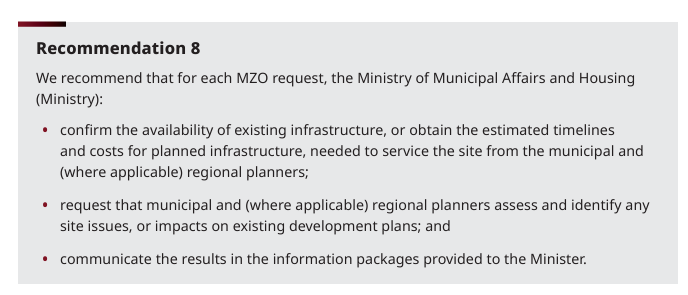This is the final instalment of a two-part Industry Perspectives Op-Ed by Andy Manahan, senior fellow, Global Public Affairs, looking at ministerial zoning orders in Ontario.
In the spring of 2024, the Ministry of Municipal Affairs and Housing (MMAH) implemented what was supposed to be a formal application or review process for the consideration of MZO (ministerial zoning order) requests. In the December 2024 report, the AG pointed out even with a more formal process, there is still no prioritization or timeline criteria to properly assess MZO requests, and there is a lack of identification of risks regarding natural hazards and the environment.
While local governments have a good understanding of the links between growth in a municipality and available servicing, the AG’s report points out “infrastructure capacity and servicing (such as water and wastewater)…is a key consideration for any development.”
Instead, it found “for most MZOs, there was no assessment of whether the sites for re-zoning had access to servicing.”
This disconnect led to zoning orders being approved that in some cases didn’t result in construction for years, according to the AG. There were cases where MZOs were approved to speed up the development on sites that wouldn’t have access to key services like wastewater for “years and sometimes decades.”
In cases where a municipal council put forward an MZO request, it was often with the proviso that the ministry impose conditions in which the developer would supply a number of affordable housing units, for example. The AG discovered during its audit process those requests were ignored by the MMAH. With a moribund housing market, it is likely builders pointed out that additional requirements such as this would undermine the business case for proceeding with the project.
AG Spence provided examples in which perceived preferential treatment for certain proponents outweighed good planning. There is a case to be made that politicians are elected to make decisions that drive change, but as the AG pointed out the flawed process opened them up to criticism.
Is the MZO short-cut worth it?
The increased use of MZOs, however, is more a response to the problems with the local planning approvals process where applications are slowed down by siloed departments, multiple requirements, strong local opposition or a lack of municipal staff. There are certainly developers who view the MZO as a short-cut process to expedite their projects but there is no certainty this will help to get shovels in the ground any sooner, especially if there are servicing constraints or a lack of consumer confidence.
A few years ago, there was public backlash when a major distribution centre was to be built near provincially significant wetlands in Pickering. Following protests by resident and other organizations, Pickering Council eventually passed a resolution requesting that the minister revoke the MZO for a portion of the property. To maintain good community relations the company then located its 1.1 million square foot industrial facility in Ajax.
These types of incidents can be avoided by better upfront planning, anticipating community needs and mitigating overarching concerns. The AG points out senior staff did not do its due diligence in many cases due in part to pressure to make decisions in short time frames. While fast-tracking might expedite employment and tax benefits, robust planning and engagement is still necessary to ensure MZOs do not result in public backlash with the unintended consequences that emanate from a bypass approach that may actually set back a project.

Funding and land value capture
Even though the province will be providing additional funding for local infrastructure projects (federal funding will also be required to meet our infrastructure shortfalls), it is the municipal sector that has the responsibility to plan and deliver local infrastructure projects that support development.
Granting MZO powers to the infrastructure minister – such as for transit-oriented communities – will be successful only if upper orders of government continue to contribute the necessary funds and take a co-ordinated approach to expedite construction. In rapidly urbanizing regions, creating higher density and livable communities is important but how the extra development value will be reinvested in transit expansion is an issue that needs more attention.
Focus on approvals modernization
There are broader questions at stake here. Outside of setting broad parameters as was done under the 2006 Places to Grow Act, much of the provincial legislation concerning growth planning over the decades has been around the framework of allowing municipalities to set direction through the use of official plans, with adherence to documents such as provincial policy statements. Municipal autonomy was viewed as appropriate as it would be extremely difficult for the Ontario government to deal with a myriad of local planning issues.
For large infrastructure projects, an agreed upon remedy for cost overruns is to outline project goals and scope well in advance. This should result in projects being approved and delivered faster. A similar approach will be essential to deliver the housing we need at scale. The 2024 provincial policy statement provides this direction already: “align development with infrastructure to build a strong and competitive economy that is investment-ready,” while at the same time a key plank is to “protect agricultural lands, the environment, public health and safety.”
With the ramp up of more MZO requests, how will the province effectively oversee so many local planning issues? How will public input and First Nations consultation be managed in appropriate ways? If current and future ministers have broad discretion to make decisions under the Planning Act without being bound to provincial policy consistency, will this add to the subjectivity already apparent in recent ministerial decision-making? And will local MPPs object to ministerial overrides such as the recent Dresden landfill case?
These are just a few of the logistical issues that should be considered when drafting the regulations for Bill 17, but the biggest one is this: Why not improve the municipal planning approvals process so that projects are approved in a more efficient and predictable way?
Approvals modernization needs to be the primary focus, with an expanded use of digital applications such as e-permitting to streamline processes and make them more transparent. Requirements need to be reviewed to make sure they are proportionate and cannot be used to block development indefinitely without legitimate reason. Even digital twins have shown promise in other jurisdictions to better plan urban growth in a connected way using large data sets for infrastructure, energy and buildings.
A focus on approvals modernization, combined with an overhaul of outdated zoning rules, will be more productive overall to ensure that Ontario can build the housing and other community infrastructure that a growing population demands. Over the short term, MZOs certainly have a place in Ontario’s system but over the medium to long-term should be used judiciously where the minister would apply the section 47 provision only for special or extraordinary circumstances.
Andy Manahan is a senior fellow at Global Public Affairs and has over 30 years of experience in infrastructure, construction and development.
To comment or pitch an Industry Perspectives Op-ed submission idea, email editor@dailycommercialnews.com.












Recent Comments